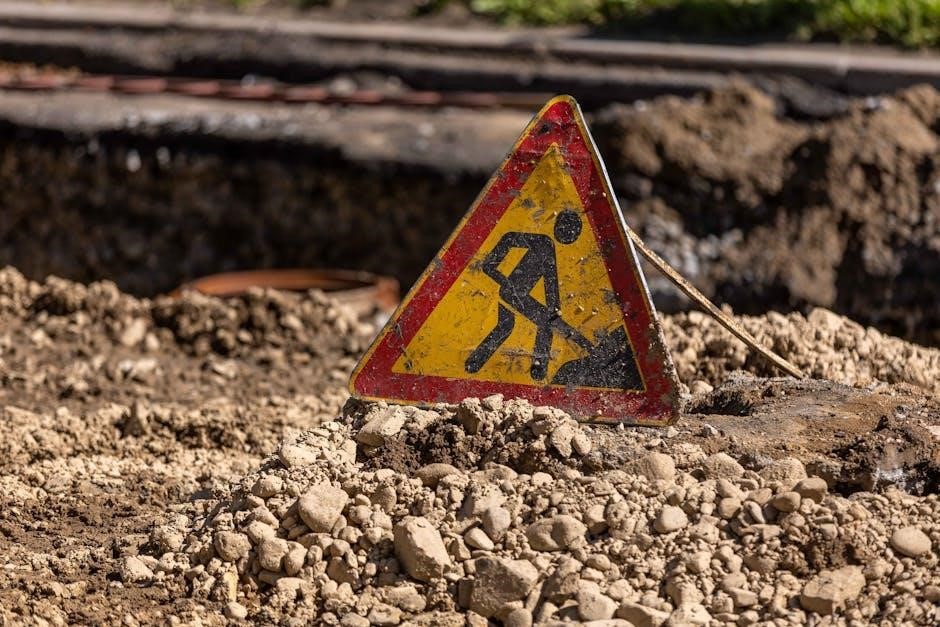A Private Road Maintenance Agreement is a legally binding document outlining the responsibilities and obligations for maintaining private roads‚ ensuring safety‚ and preventing disputes among property owners.
1.1 Definition and Purpose
A Private Road Maintenance Agreement is a legally binding contract that outlines the responsibilities and obligations for maintaining private roads. It ensures that all parties involved‚ such as property owners or homeowners’ associations‚ contribute fairly to the upkeep of the road. This agreement is essential for homeowners who share access to a private road‚ as it prevents disputes and guarantees the road remains safe and functional. The purpose of such an agreement is to establish clear guidelines for maintenance‚ repair‚ and cost-sharing‚ protecting the interests of all parties and ensuring compliance with local regulations.

1.2 Importance of a Private Road Maintenance Agreement
A Private Road Maintenance Agreement is crucial for ensuring the longevity and safety of private roads. It prevents disputes among property owners by clearly defining responsibilities and cost-sharing. This agreement is essential for maintaining access to properties‚ especially in areas where public funding is unavailable. It also protects parties from legal liabilities and financial burdens by establishing a structured plan for repairs and upkeep. Without such an agreement‚ private roads may deteriorate‚ leading to safety hazards and decreased property values. Thus‚ it is a vital tool for managing shared infrastructure effectively.

Key Elements of a Private Road Maintenance Agreement
A Private Road Maintenance Agreement typically includes details about involved parties‚ maintenance responsibilities‚ financial arrangements‚ and dispute resolution mechanisms to ensure smooth road upkeep and accountability.
2.1 Scope of Maintenance Responsibilities
The scope of maintenance responsibilities in a private road agreement typically includes tasks like grading‚ paving‚ gravel restoration‚ and snow removal. It also covers signage installation and drainage upkeep to ensure road safety and accessibility. These responsibilities are usually divided among property owners or assigned to a contractor‚ with clear guidelines to avoid disputes. Regular inspections and repairs‚ such as pothole filling and vegetation control‚ are often outlined to maintain the road’s condition. The agreement may also specify how emergencies‚ like storm damage‚ will be addressed to ensure prompt action and shared accountability.
2.2 Involved Parties and Their Roles
The involved parties in a private road maintenance agreement typically include property owners‚ contractors‚ and sometimes local governments. Property owners are responsible for contributing financially and making decisions about maintenance activities. Contractors are hired to perform the actual work‚ such as paving or snow removal. Local governments may oversee compliance with regulations or provide guidance. In some cases‚ a road manager or association is appointed to coordinate efforts and ensure tasks are completed. Clear roles help maintain accountability and ensure the road remains safe and accessible for all users. Open communication among parties is essential for smooth operations.
2.3 Financial Arrangements and Contributions
Financial arrangements in a private road maintenance agreement outline how costs are shared among property owners or stakeholders. Contributions are typically proportional to the use or benefit each party derives from the road. Payments may be made annually or as special assessments for major repairs. The agreement often specifies how funds are collected‚ managed‚ and disbursed‚ ensuring transparency and fairness. In some cases‚ a third-party manager or escrow account may oversee finances to prevent disputes. Clear financial terms help sustain the road’s condition and ensure equitable burden sharing among all parties involved in its maintenance.

Legal Requirements and Considerations
A private road maintenance agreement must comply with local laws and regulations‚ ensuring all parties understand their legal obligations and liabilities. Professional legal review is recommended.
3.1 Compliance with Local Laws and Regulations
Compliance with local laws and regulations is essential for a private road maintenance agreement. It ensures that the agreement adheres to legal standards‚ avoiding potential disputes or penalties.
Local ordinances may dictate specific requirements for road maintenance‚ such as materials‚ design standards‚ and environmental considerations.
Failure to comply can result in legal consequences‚ emphasizing the importance of consulting local authorities during the drafting process.
This ensures the agreement is legally binding and meets all necessary criteria.
3.2 Liability and Indemnification Clauses
Liability and indemnification clauses are critical components of a private road maintenance agreement. These clauses outline the responsibilities of involved parties in case of damages‚ injuries‚ or other liabilities arising from road maintenance activities.
Indemnification clauses protect parties from claims made by third parties‚ such as drivers or pedestrians‚ ensuring financial protection.
Clearly defining liability helps prevent disputes and ensures that all parties are held accountable for their actions.
Legal counsel is often recommended to draft these clauses fairly and effectively.

Creating a Private Road Maintenance Agreement
Creating a private road maintenance agreement involves consulting legal professionals‚ outlining responsibilities‚ and ensuring compliance with local regulations. All parties must agree on terms and sign the document.
4.1 Steps to Draft the Agreement
Drafting a private road maintenance agreement involves several key steps. First‚ define the purpose and scope of the agreement‚ including the specific road and properties involved. Next‚ identify all parties responsible for maintenance‚ such as homeowners or contractors. Outline the responsibilities of each party‚ including financial contributions and tasks. Include provisions for dispute resolution and compliance with local laws. Finally‚ have the document reviewed by a legal professional and signed by all parties to ensure validity. Proper documentation and clear communication are essential for a fair and enforceable agreement.
4.2 Required Documentation and Signatures
When finalizing a private road maintenance agreement‚ specific documentation and signatures are necessary to ensure its validity. The agreement must include detailed descriptions of the private road‚ a list of all participating property owners‚ and their respective contributions. Signatures from all parties involved‚ such as homeowners‚ contractors‚ or local authorities‚ are required to confirm agreement. Witness signatures may also be needed‚ depending on local regulations. Additionally‚ the document should be notarized and recorded with the appropriate local or county office to ensure it is legally binding and enforceable.

Templates and Forms for Private Road Maintenance Agreements
Templates and forms for private road maintenance agreements are widely available online‚ offering customizable solutions to outline responsibilities‚ contributions‚ and legal requirements for property owners and organizations.
5.1 Sample Templates Available Online

Several websites offer sample templates for private road maintenance agreements‚ such as Jotform and Rocket Lawyer. These templates provide a framework for outlining responsibilities‚ financial contributions‚ and legal requirements. They often include sections for property owner signatures‚ maintenance schedules‚ and dispute resolution. Users can download and customize these documents to suit their specific needs. For example‚ Jotform’s free template allows users to input details about the road‚ parties involved‚ and payment terms. Rocket Lawyer also offers customizable agreements with a 7-day free trial. These resources simplify the process of creating a legally binding document.
5;2 Customization Options for Specific Needs
Private road maintenance agreement templates can be tailored to address unique circumstances. Users can modify clauses to reflect specific contributions‚ maintenance schedules‚ or dispute resolution processes. For instance‚ Jotform’s template allows customization of payment terms and party details‚ while Rocket Lawyer’s platform offers options to adjust liability clauses. Additionally‚ some templates enable the inclusion of easement details or recording requirements. This flexibility ensures that the agreement aligns with the particular needs of the property owners and complies with local regulations. Customization is essential for creating a document that is both practical and legally sound.

Best Practices for Implementing the Agreement
Regularly review and update the agreement to ensure compliance with local laws and address evolving maintenance needs. Schedule periodic inspections and communicate clearly with all parties involved to prevent disputes and ensure smooth operations.
6.1 Regular Maintenance Schedules
Establishing a consistent maintenance schedule is crucial for private road upkeep. This includes regular inspections‚ grading‚ and resurfacing as needed. Creating a detailed calendar ensures tasks are not overlooked and helps distribute responsibilities fairly among involved parties. Documentation of completed work is essential for transparency and accountability. By adhering to a structured plan‚ the road remains safe and functional‚ preventing costly repairs and potential liabilities. Regular communication among all stakeholders ensures that maintenance activities are coordinated efficiently and meet the agreed-upon standards outlined in the agreement.
6;2 Dispute Resolution Mechanisms
A well-defined dispute resolution process is essential to address conflicts arising from private road maintenance. Mediation or arbitration are common methods to resolve issues amicably. Clear steps for resolving disagreements‚ such as involving neutral third parties or legal advisors‚ should be outlined. Regular communication and documented agreements help prevent misunderstandings. Establishing a fair and transparent process ensures that all parties are heard and that decisions are made in the best interest of the road’s upkeep and the community. This mechanism fosters cooperation and maintains harmony among property owners.

Common Mistakes to Avoid
Not involving legal counsel‚ overlooking maintenance responsibilities‚ and failing to document agreements can lead to disputes and legal issues. Ensure clarity and fairness in all terms.
7.1 Overlooking Legal Requirements
Ignoring legal standards can result in disputes and non-compliance issues. Ensure all agreements align with local regulations‚ including recording requirements and indemnification clauses. Consulting legal counsel is essential to avoid violations and ensure enforcement. Proper documentation and signatures are mandatory to validate the agreement. Overlooking these elements can lead to legal challenges and financial penalties. Always verify state and local laws governing private road maintenance to prevent oversight. Legal compliance ensures the agreement’s validity and protects all parties involved from potential liabilities and conflicts.
7.2 Poor Communication Among Parties
Inadequate communication can lead to misunderstandings and disputes. Ensure all parties clearly understand their roles‚ responsibilities‚ and financial obligations. Regular updates and transparent discussions are crucial to maintain harmony. Miscommunication about maintenance schedules or cost sharing can escalate tensions. Establishing a clear line of communication helps prevent conflicts and ensures smooth collaboration. Without effective dialogue‚ even minor issues can become major problems‚ delaying maintenance and affecting property values. Regular meetings and written agreements can mitigate these risks and foster cooperation among all parties involved in the private road maintenance process.

